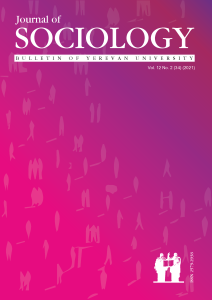Institutional Development of Child Care in Armenia: Structural-Organizational, or Value-Systemic Approach?
DOI:
https://doi.org/10.46991/BYSU:F/2021.12.2.034Keywords:
reorganization of institutions, reforms, reunification, latent resistance, structural-organizational changes, value-systemic changesAbstract
Discussions on the transformation of social issues, particularly the lack of a viable approach to responding to the shortcomings of family care, from the Soviet era are still relevant thirty years later. In particular, education, care and protection of children in institutions and to accommodate changing practices used in the process of forming a latent attitude system based on children's rights, non-formal resistance discussion interesting to understand what potential they have undertaken an organizational structural transformation of values desired to bring about change. Will these transformations be able to influence the changing practices of helping children in need outside of the family environment something that continues to be the subject of unspoken agreement between the three parent-decision-making parties today, ignoring children's rights and interests?
References
Acemoglu, D., James A. R., (2008). Persistence of Power, Elites, and Institutions. American Economic Review 98 (1). 267-293 DOI: 10.1257/aer.98.1.267
Antonyan, M. (2015). "The Social Cost of Caring for Genocide Orphans, Genocide Studies in the Focus of the Social Sciences." Collection of articles, YSU Publishing House, Yerevan, pp. 120-134.
Auzan, A. (2017). "Economics of everything. How do the institutes determine our life?". Mann, Ivanov and Ferber.
Axford, N. (2010). Is social exclusion a useful concept in children's services? British Journal of Social Work, 40 (1), 737-754. DOI: 10.1093/bjsw/bcn121
Brannen, J., Mooney, A., Statham, J. (2009) Childhood Experiences. a Commitment To Caring and Care Work With Vulnerable Children. Childhood. 16 (3): 377-393. DOI: 10.1177 / 0907568209335317.
Fahey, T. (1995). PRIVACY AND THE FAMILY: CONCEPTUAL AND EMPIRICAL REFLECTIONS. Sociology, 29(4), 687-702.DOI: 10.1177/0038038595029004008
Feinstein, L., Sabates, R. (2006). Predicting adult life outcomes from earlier signals: Identifying those at risk. Center for Research on the Wider Benefits of Learning. London: Institute of Education․
Heine, S.J. (2001) Self as a cultural product. An examination of East Asian and North American selves. Journal of Personality 69 (6): 882-906. DOI: 10.1111/1467-6494.696168
Hofstede, G. (1991) Cultures and Organizations. Software of the Mind. London: McGraw-Hill.
Hollway, W. (2006) The Capacity to Care. Gender and Ethical Subjectivity. London: Routledge:
Lister, R. (2004) Poverty. Cambridge: Polity Press.
Nicholson, C., Dwivedi, K.N., Irwin, M. (2010) Children and Adolescents in Trauma. Creative therapeutic approaches. London: Jessica Kingsley Publishers.
Prout, A. and James, A. (1990) A new paradigm for the sociology of childhood? In: James A and Prout A (eds) Constructing and Reconstructing Childhood. London: Falmer Press.
Pulterovich, V., (2012). «Reform design. How to Search for Interim Institutions », MPRA Paper 41043, University Library of Munich, Germany:
Qvortrup, J., Corsaro, W. A., & Honig, M.-S. (2009). The Palgrave handbook of childhood studies. Houndmills, Basingstoke, Hampshire: Palgrave Macmillan. DOI: 10.1057/9780230274686
Redmond, G. (2009) Children as actors. How does the child perspectives literature treat agency in the context of poverty? Social Policy and Society 8 (4): 541-550. DOI: 10.1017/S147474640999011X
Ridge, T., Saunders, P. (2009) Introduction: Themed section on children's perspectives on poverty and disadvantage in rich and developing countries. Social Policy and Society 8 (4): 499-502. DOI: 10.1017/S1474746409990078
Sevenhuijsen, S. (1998) Citizenship and the Ethics of Care. London: Routledge․
Tronto, J. (1993) Moral Boundaries. A Political Argument for the Ethics of Care. London: Routledge․
Verhallen, T., Hall, C.J., Slembrouck, S. (2019) Family support and child protection approaches. Historicizing perspectives on contemporary discourses of social work. Qualitative Social Work. 18 (2): 1-16. doi: 10.1177 / 1473325017712798.
Ward, A., Kajetan, K., Pooley, J., Worthington, A., (2003) Therapeutic Communities for Children and Young People. London: Jessica Kingsley Publishers.
West, A., Lewis, J. and Currie, P. (2009) Students' Facebook 'friends': Public and private spheres. Journal of Youth Studies 12 (6): 615-27, DOI: 10.1080/13676260902960752
Downloads
Published
Issue
Section
License
Copyright (c) 2021 Mira Antonyan

This work is licensed under a Creative Commons Attribution-NonCommercial 4.0 International License.





